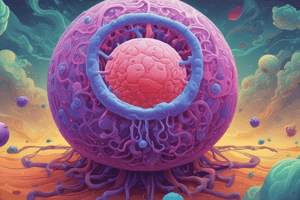Podcast
Questions and Answers
What characterizes the primary stage of syphilis?
What characterizes the primary stage of syphilis?
- Neurological damage to the fetus
- It is highly infectious (correct)
- Mucosal rashes appear
- No symptoms present
Which bacterium is primarily responsible for causing gastritis and peptic ulcers?
Which bacterium is primarily responsible for causing gastritis and peptic ulcers?
- Helicobacter pylori (correct)
- Vibrio cholerae
- Borrelia burgdorferi
- Campylobacter jejuni
What is a significant effect of untreated cholera infection?
What is a significant effect of untreated cholera infection?
- Mucosal rashes
- Neurodegenerative effects in infants
- Severe arthritis
- Severe loss of fluid and electrolytes (correct)
Which stage of syphilis may show no symptoms, resulting in many infections stopping?
Which stage of syphilis may show no symptoms, resulting in many infections stopping?
What is the primary source of infection for Campylobacter jejuni?
What is the primary source of infection for Campylobacter jejuni?
Which genera of the Rickettsias group causes diseases in humans?
Which genera of the Rickettsias group causes diseases in humans?
What is the main transmission vector for Rickettsia rickettsii?
What is the main transmission vector for Rickettsia rickettsii?
What is a significant risk factor for severe outcomes when infected with Rickettsia prowazekii?
What is a significant risk factor for severe outcomes when infected with Rickettsia prowazekii?
Which characteristic distinguishes reticulate bodies from elementary bodies in Chlamydia trachomatis?
Which characteristic distinguishes reticulate bodies from elementary bodies in Chlamydia trachomatis?
What is the most common reportable STD in the US caused by Chlamydia trachomatis?
What is the most common reportable STD in the US caused by Chlamydia trachomatis?
What is a potential consequence of reinfection with Chlamydia trachomatis in women?
What is a potential consequence of reinfection with Chlamydia trachomatis in women?
What does the infection of Chlamydia trachomatis typically cause in men?
What does the infection of Chlamydia trachomatis typically cause in men?
Which of the following is true about Treponema pallidum pallidum?
Which of the following is true about Treponema pallidum pallidum?
Flashcards
Rickettsias
Rickettsias
Tiny, gram-negative bacteria that survive inside host cells.
Obligate intracellular parasites
Obligate intracellular parasites
Organisms that require a host cell to reproduce.
Rocky Mountain Spotted Fever
Rocky Mountain Spotted Fever
Disease caused by Rickettsia rickettsii, transmitted by ticks.
Chlamydia
Chlamydia
Signup and view all the flashcards
Chlamydia trachomatis
Chlamydia trachomatis
Signup and view all the flashcards
Spirochetes
Spirochetes
Signup and view all the flashcards
Treponemas (T.pallidum)
Treponemas (T.pallidum)
Signup and view all the flashcards
Epidemic Typhus
Epidemic Typhus
Signup and view all the flashcards
Syphilis Stages
Syphilis Stages
Signup and view all the flashcards
Congenital Syphilis
Congenital Syphilis
Signup and view all the flashcards
Lyme Disease Pathogen
Lyme Disease Pathogen
Signup and view all the flashcards
Cholera Symptoms
Cholera Symptoms
Signup and view all the flashcards
Campylobacter Jejuni Source
Campylobacter Jejuni Source
Signup and view all the flashcards
Study Notes
Rickettsias
- Extremely small G- bacteria
- Obligate intracellular parasites
- Four genera cause human disease: Rickettsia, Orientia, Ehrlichia, and Anaplasma
- Rickettsia genus: bacteria live inside host cell's cytosol after phagosome lysis
- R. rickettsii: Rocky Mountain Spotted Fever, transmitted by wood ticks
- Without early diagnosis, mortality rate is approximately 20%
- Prevention involves avoiding ticks
- R. prowazekii: Epidemic Typhus
- Causes high fever, depression, and rash
- Occurs in crowded, unsanitary conditions
- High death rate in elderly patients (60%) and younger patients (20%)
- Ehrlichia:
- Similar symptoms to Rocky Mountain Spotted Fever, but without the rash
- Transmitted by lone star ticks (Amblyoma) and deer ticks (Ixodes)
- Triggers its own phagocytosis
Chlamydias
- Once thought to be viruses
- Grow and multiply within host cell vesicles
- Two forms:
- Elementary bodies (EBs): dormant, infective stage
- Reticulate bodies (RBs): non-infective, replicating stage
- Chlamydia trachomatis:
- Enters body via abrasions and lacerations
- Infects conjunctiva and mucous membranes
- Most common reportable STD in the US
- Usually asymptomatic in women but can cause discharge and painful urination
Spirochetes
- Phylum Spirochaetes
- Includes Treponema, Borrelia, and Leptospira
- T. pallidum pallidum: Causative agent of syphilis
- Primary stage: highly infectious
- Secondary stage: mucosal rashes, infectious
- Latent period: No symptoms, many infections stop here
- Tertiary stage: appears years after latency; 25% untreated develop neurological damage
- Congenital syphilis: Transmitted through placenta damaging fetus
- Government-funded research: Tuskegee Syphilis Study
- Borrelia burgdorferi: Lyme Disease
- Lacks iron, uses manganese
- Severe arthritis can last for years, resulting from the body's immune response
Vibrio
- Vibrio cholerae: "Rice-water stool"; characteristic symptom
- Causes severe fluid and electrolyte loss (3-5 gallons/day)
- Can cause shock, organ failure, and death (50% untreated)
- Campylobacter jejuni: Likely most common cause of gastroenteritis in the US
- Poultry is the most common source of infection
- Causes fever, cramping, abdominal pain, diarrhea, and dysentery
Studying That Suits You
Use AI to generate personalized quizzes and flashcards to suit your learning preferences.




